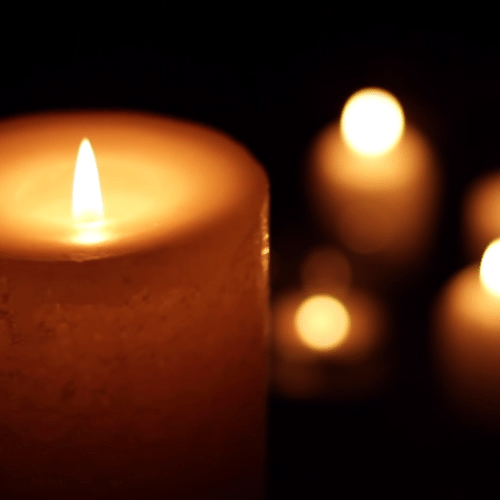You’re losing energy every day. Why do you feel so tired? Why the lack of motivation? Why the lack of inspiration, the lack of your having lots of vitality and enthusiasm? Well, part of that is because you’re losing a lot of energy to things that are incomplete, unfulfilled, unforgiven, tasks that need to be undertaken, problems that are not being addressed. You’re losing energy. It’s like it’s wintertime and all the windows of your house are open. You’re losing energy.
Marshall Vian Summers gives a teaching on how real change is accomplished in life. Marshall discusses the sense of inertia that can build in your life if you are not exerting the effort and taking the many steps to make the changes you know you need to make. Marshall reveals that real change and the answers to the big problems in life are the product of a journey, a journey of many steps. Recorded on the third night of the 2020 Steps to Knowledge Vigil.
Every problem that you’re avoiding or deflecting or putting off is costing you energy.
You’re losing energy every day. Why do you feel so tired? Why the lack of motivation? Why the lack of inspiration, the lack of your having lots of vitality and enthusiasm? Well, part of that is because you’re losing a lot of energy to things that are incomplete, unfulfilled, unforgiven, tasks that need to be undertaken, problems that are not being addressed. You’re losing energy. It’s like it’s wintertime and all the windows of your house are open. You’re losing energy.
And one of the outcomes of losing energy over time is you enter a state like inertia. You hit a low energy state and that’s where you live. And when you live in a lower energy state, that means it’s very difficult for you to get yourself moving to do anything that requires effort and consistency, application, dedication. You may see the need. You will say to yourself, “Well, I need to lose 50 pounds. I really need to do Steps to Knowledge. I really need to get a new job”, but you don’t have the energy to do it. I call that inertia.
Now inertia is a physics term and it means other things. But it’s related to the fact that an object in space becomes resistant to movement if it becomes too settled in one place. When we become too settled in a life without any kind of dynamic change, we become resistant to change. Even if it’s necessary change, even if it’s good change, we just don’t have the energy to take it on.
So why is it we can’t get ourselves up to do the Steps practice every day? You could make time for it. It wouldn’t be easy. Sometimes it’s quite awkward to do that. But you would find if you added up all the wasted time in your day, it would add up to enough time for you to do Steps practices and read that Step a couple of times a day, and think about it.
So somehow there’s a resistance factor that lives within us that’s built up over time. It is a resistance to change even if change is desired. I hear a lot of people talking about change, but I don’t see many people changing, as if change is all about what other people are supposed to do.
So we get into this point of inertia and then we can’t get focused. We can’t mount the effort. We can’t sustain a practice. But you can because you do it every day. You brush your teeth every day, maybe take a shower every day. You eat your meals every day. You do lots of things every day. But if something new comes along that requires real time and focus, it seems really hard and I understand this.
If you’re keeping pace with your life in real time as you’ve gone along, you will have much more energy and vitality to bring to this endeavor. But if you’ve been lagging in any way or holding back or just letting things slide, you’re going to be losing energy. And that loss of energy is going to put you at a lower energy state. You may have the right ideas; you may see a true need; you may have very good principles for your life, but you really are lacking in the energy that enables you to follow these things. This is a problem.
What resolves inertia? Taking action. Hard at first, but once you get used to taking action and feeling the rewards of doing that and the freedom of energy in doing that, you begin to become more energetic, more inspired, more enthusiastic and more confident that you can take things on.
You know with human beings, if we’re not adequately challenged in life, we really do decline. Not just in old age, but we decline at any age. If we do not have adequate, appropriate challenge and we’re [not] meeting those challenges and recognizing them, we decline. Or we begin to live in a state of decline. It can happen for 20 year-olds. There are people who never took on the challenges of their life and so they’ve been in decline the whole way. We’ve gone through periods of decline where we were just sort of lost and adrift, or just unhappily acquiescing to a set of circumstances that were not right for us. And it took a lot of effort to get ourselves going again. So that’s very real.
So doing Steps to Knowledge really is the way out of this morass, this fog of inertia because it requires you to do something every day. It gives you things to really think about, not just to read and memorize, but just really to think about. And it asks you to show up for practice. And you know in practice, half of success is showing up, to quote Woody Allen’s very serious quote about that: “Half of success is showing up.” You don’t have to show up rigidly, but consistently. And when you do show up, you need to be present to what you’re doing there.
This is not a place to get answers for your problems or to think about other people. This is a time to focus on what this teaching is delivering to you today—seeing how you could practice it. What does it apply to in your life? What is it telling you you need to be aware of?
And then of course, the stillness practice is really a massive redirect for your mind, which is anything but still. It’s like the mind…it’s like a runaway train. It’s just going and going and going and you’re just hanging on. In this case, you’re learning to gain control of your mind which heretofore has controlled you—a slow but necessary process. You’ll never gain this control by just wanting freedom and strength for yourself; it’s not enough. You actually have to lay down the tracks for it. You have to establish even the neural pathways in your brain for it. Your infrastructure of your brain, that has to be remodeled.
So the big problems don’t come with simple answers; they only come with simple steps. You take steps to resolve them because they’re big. A problem, a fundamental problem in your relationships, with your health, is not something that you just have an answer to. You have to take a journey. Every big change is like a journey with many steps, just like Steps to Knowledge is a journey with many steps.
To make a real change in your core relationships and your health requires a lot of intention and many steps, and you’ll have to stay with it. There’s no easy fixes. And you know, the change involves parts of ourselves we never even think of. Many people think all you need to do is just change your diet; that’s like low-hanging fruit. But you’re going to have to change your attitudes, your habits of thinking, how you spend your time, how you relate to other people, who you really want to be with, how you regard your feelings and emotions, how you regard your mind and your own mental states. Now your problem opens up a lot of dimensions to be explored and realized. It’s not just a simple change in your diet or your surroundings that can produce change at that level.
So the big problems are journeys with many steps.



